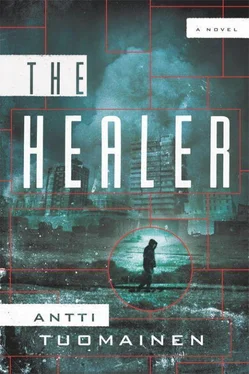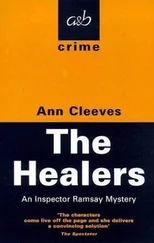I got Jaatinen to have surveillance videos sent to the police servers. The camera was on the corner of the old Sähkötalo building, about ten meters off the ground, and had a wide shot of the entire intersection, so individual people were mere dark shapes that turned pixilated when you enlarged them.
I clicked 10:50 p.m. People came and went by the hundreds. I was sure that in spite of the abundance of people I would be able to spot Johanna in the crowd. The minutes went by. The time record read 10:52, then 10:53, then 10:54. I didn’t see Johanna. I clicked back to 10:50 and looked at the three minutes again. And again. I was surprised and disappointed and 100 percent sure that none of the people I saw were Johanna.
I stood up, got some coffee, and sat down in front of the computer again. Jaatinen had brought me to a workroom on the second floor, showed me a computer I could use, and wrote down the password for searching the data. The password got me into the telephone and surveillance camera records and certain identification databanks. The bar at the bottom of the screen said that Jaatinen’s computer was linked to this one, and he could see where I was and what I was doing. It also promised to cut off my connections if I went astray.
I was sitting in an open room surrounded by other people tapping on computers. None of them had looked up from their screens, let alone spoken, for the entire hour I’d been sitting there. Maybe we were all doing the same thing: searching and hoping—and, of course, fearing that just one moment of inattention could mean losing that crumb of an answer forever.
I watched the surveillance footage again, focusing on each person’s legs. None of them scurried along like Johanna did. She had always laughed at my lazy dawdle. Even though her legs were shorter than mine she walked twice as fast. If she was in the video, I would have seen her. I clicked to the beginning again, leaned back, and watched.
The rain played tricks with the image, soaking the streets and turning the sidewalks shiny, blurring the entire view. At 10:53 the intersection was transformed by the headlights of cars approaching from several directions, combined with the yellow light of the street lamps and the pulsing flash of the signs on the sides of the buildings, into a sparkling bouquet of light, its powerful glow coloring the millions of drops of rain falling from the sky. The result was a landscape that would have made a beautiful painting, but was pretty lousy as evidence.
I sighed and was about to give up, when I realized that I wasn’t necessarily looking at the wrong video.
Johanna didn’t have to be on foot.
She could just as well have been in a car.
I should be used to long spells of slim productivity, but they always seem to take me by surprise. When I’m writing I sometimes sit for hours and hours in front of the computer and only get a few new lines on the screen. Sometimes I just have to content myself with editing old text, a word here, a word there.
I spent an hour enlarging the image and examining it from all angles, writing down partial license numbers and the makes and colors of the cars and searching the drivers’ registry—without any luck.
My eyes hurt.
It had been thirty-six hours since Johanna’s last phone call.
I closed my eyes. My eyelids felt like stale orange peel. I rubbed them and saw shooting stars flashing from one side of the darkness to the other.
When I lowered my hands, Jaatinen was standing beside me. He looked at the maximum magnification image from the surveillance camera for a moment and then turned to look at me. I didn’t say anything.
“Sometimes you don’t see it until you stop looking,” he said. “You realize something you already knew.”
“I suppose.”
“I’m going downtown,” he said, scanning the screen again. “You can come along, if you want.”
I looked at the picture, looked at Jaatinen, and said yes.
Jaatinen’s unmarked car was as neutral and metal-gray as the day that was dawning. The sun wasn’t exactly shining, but the weather was almost clear, and round-bellied clouds hung low in the sky to remind us that the world still had something other than rain to offer.
Jaatinen’s driving was unhurried. He used his turn signal even when no one was there to see it. There was something touching about that, something dignified. I couldn’t help but think that he might be one of the last people on earth to obey all laws and statutes. Maybe he read my mind, because he said, “An old habit.”
Then he signaled again as we changed lanes to avoid a gap in the asphalt. We reached the Töölö Sports Hall and stopped at the light. The line for the food bank stretched hundreds of meters around the back of the building. I looked at the people in line—expressionless, resigned, their expectations ended. The security guards monitoring the line caught my attention.
There were new security companies springing up all the time, of course, but I didn’t remember seeing any guards like these, with their black coveralls and the insignia on their backs. It resembled a large letter A, but not quite. Didn’t I remember it from somewhere? Or was I just imagining that I did? I took a few photos of them just in case, both long shots and close-ups of the insignia.
Jaatinen looked at me curiously.
I nodded toward the security guards. He turned to look. I asked if he knew anything about them. He watched them a moment longer and shrugged, then looked at the road ahead again, as if he’d been personally invited to do so.
The light changed and we moved on.
“Sometimes it seems like there’s no sense in it,” he said. “What are those guys guarding? Making sure people line up in an orderly fashion to get some food that’s just going to run out eventually. Who pays them to do that, and why?”
He stopped at another light. The merest hint of a smile crept over his face, surprisingly bright in spite of its faintness and melancholy, lighting up not just his face but the entire car. He glanced at me and said in a gentler tone, “I don’t suppose it does any good for me to think about it.”
The walls of the Opera House were darkened with rain and damp, its windows covered with plywood and tarps. The square around it, scattered with litter and plain old garbage, was like another world in the still-gray morning light, a world you didn’t want to believe was real.
“These things occur to us,” I said.
Jaatinen didn’t answer. He reached for the gearshift, quickly shifted into neutral, and let up the clutch.
“Can I ask you something?”
The question sounded sincere. I said by all means.
“What did you used to do?”
“I was a poet.”
Jaatinen was quiet for a moment. It was comical how the reaction to this simple statement never changed even when the whole world was changing around me. Next he would ask the names of my books and then he would tell me he’d never read them, or heard of them.
“What have you published?” he said.
“ The Most Beautiful Words on Your Lips was my first collection. Then A Wind All Winter , and the last one was Don’t Forget to Remember .”
“I don’t think I’ve ever…”
“No need to apologize,” I said, smiling. “No one else has, either. I managed to publish three collections before all this started. They sold about two hundred copies each, including library sales. They disappeared a long time ago.”
We both watched as an elderly man in a long gray coat tried to help a woman with a scarf on her head cross the street in short, uncertain steps before the light changed. The curb was too high for her, and the man didn’t have the strength to lift her onto the sidewalk. Somehow they leaned on each other and, one step at a time, hauled each other over it. A bus rushed by with its horn blaring, its side mirror missing the old man’s head by mere centimeters.
Читать дальше












